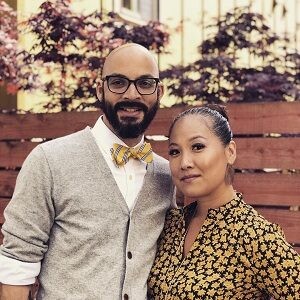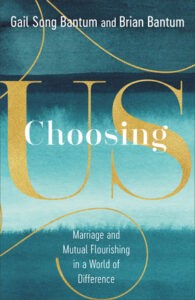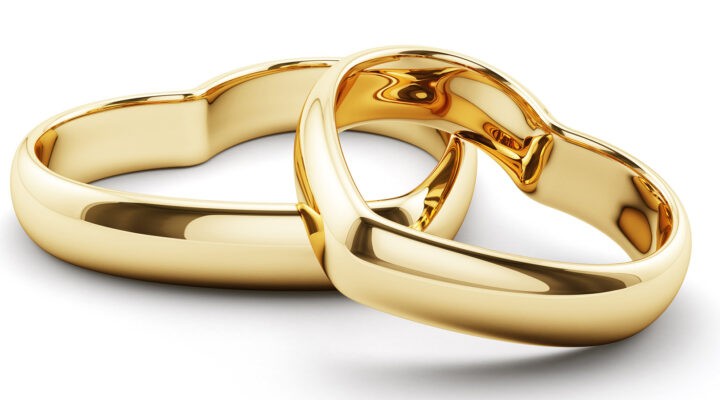“People change. Maybe you should give this some time to figure out who you are before you get married,” she said. We had flown to California for me (Gail) to introduce Brian to a few of my aunts and extended family. Sitting in the dining room with them, Brian and I tried to listen as best we could. They clearly loved us and wanted the best for us. Brian and I were in love, and after 10 months of dating and thousands of dollars spent on phone calls, stamps, and plane and bus tickets, we knew we wanted to spend the rest of our lives together.
We were also 20 years old, and a young 20 at that. My aunts knew we would change over time, and they were worried for us.

Gail Spong Bantum and Brian Bantum
We replied, “Yes, we are going to change. But we are going to grow toward each other.” We were so smart. Of course we were going to change, we thought to ourselves. We even knew how we were going to change. We had a plan for our lives, a calling even.
Now, with our own children nearly grown, we see what they saw. We had no idea what was in store for us or who we were.
But part of what changed us wasn’t just graduating from college or the first job or clarifying vocational goals. Our life together was a journey of discovering the questions we didn’t realize we were asking, the histories and the stories that kept pulling and tugging and shaping us under the surface of our lives.
While we weren’t wrong to believe we’d grow toward one another, there was a fundamental misconception: we thought we knew who we were to begin with. In our young minds and hearts, we looked at one another and thought growing toward one another was simply a matter of loving the other person. But we didn’t understand that we were trees that had been planted in very different orchards and nurtured in different soils. Just as a tree has little understanding of itself as it grows, we had so much to learn about ourselves and our own stories, even while we were trying to grow toward this new person in our lives.
“Self-discovery is an ongoing process because we are never finished becoming.”
Self-discovery is an ongoing process because we are never finished becoming. As each year passes, as we enter into periods of lack or plenty, hardship or joy, and loss or abundance, the light of who we are refracts a little differently in new moments. The growth we experienced in ourselves and toward one another was sometimes a series of conscious decisions and explicit conversations. At other times, the growth was stopping and breathing for a moment, taking stock of what was underneath the frustration or the boredom or the work of just getting through each day, to ask ourselves who we were and who we were becoming, for ourselves and for the other person, in that moment.
As we begin to think about relationships, even before we can begin to talk about what it means to join our lives together, we need to first ask who we think we are. There are plenty of personality types and gift assessments and premarital workshops on family systems, but part of the question of knowing ourselves is beginning to recognize that we cannot know the totality of who we are in that moment or who we are going to be.
And yet, in the midst of this unknowing, there are tributaries and rivers and lakes of history, dynamics of power and oppression, formations of masculinity and femininity, structures of race and ethnic identity, all working in the midst of the stream that is our life.
The work of charting the rivers of history that live in us and have shaped us never ends. Learners of a way, be it an instrument or a life of faith or an art, are always learning and discovering something new about themselves and how they’ve changed over the years. This is no less true of ourselves as individuals. But when we bind our lives to another and live in daily intimacy and closeness, these transformations are even more pronounced.
“When two people choose to become a ‘we,’ they begin to discover more of who each person is.”
When two people choose to become a “we,” they begin to discover more of who each person is. In our own experience, and in counseling couples navigating relationships, preparing for marriage, or working through years of marriage, we have seen how the illusion of certainty and assumptions become this extra baggage that fills the rooms of their lives until they have no room to move or to even see the other person.
But the biggest assumptions that rarely emerge in these conversations are the ones people make about themselves. Usually, people think they know themselves. That’s why they can be so sure they are right and the other person is wrong. Not only do they know themselves, but they also know their own history, the way they are navigating their community, and the questions or discomfort of being different.
This certainty might be about issues of character or personality traits. But maybe they haven’t asked how, as a Black man, for example, they have navigated predominantly white spaces and how that experience has shaped or is shaping them. Maybe as a man, they haven’t asked how dynamics of gender are moving under the surface of the frustrations at home and the ease they feel at work. Even while we are discovering who we are, we are also navigating a world shaped by race, gender and sexuality. And none of these are realities that we fully understand in ourselves at any given time.
We want to reflect on personhood. We are being intentional in avoiding the word “individual,” because no one exists apart from communities and families and stories. A person is always a patchwork. But a person is also a point where all those stories and people and communities coalesce into one beautiful, unique burst of light. What happens when two bursts of light join?
To understand this, we need to think about the ones who are being joined.
 Gail Song Bantum is lead pastor at Quest Church and has created four mentoring groups nationally for women of color leaders. A nationally known speaker on topics of justice, leadership and mentoring, she has spoken at Why Christian?, Evolving Faith, Christian Community Development Association, and the Proctor Children’s Defense Fund Conference. She is married to Brian Bantum, who writes and speaks on the intersections of identity, race and gender. He is the Neal F. and Ila A. Fisher Professor of Theology at Garrett-Evangelical Theological Seminary, a contributing editor for Christian Century, and author of The Death of Race: Building a New Christianity in a Racial World and Redeeming Mulatto: A Theology of Christian Hybridity. This article is excerpted from their new book, Choosing Us, ©2022, and is used by permission of Brazos Press.
Gail Song Bantum is lead pastor at Quest Church and has created four mentoring groups nationally for women of color leaders. A nationally known speaker on topics of justice, leadership and mentoring, she has spoken at Why Christian?, Evolving Faith, Christian Community Development Association, and the Proctor Children’s Defense Fund Conference. She is married to Brian Bantum, who writes and speaks on the intersections of identity, race and gender. He is the Neal F. and Ila A. Fisher Professor of Theology at Garrett-Evangelical Theological Seminary, a contributing editor for Christian Century, and author of The Death of Race: Building a New Christianity in a Racial World and Redeeming Mulatto: A Theology of Christian Hybridity. This article is excerpted from their new book, Choosing Us, ©2022, and is used by permission of Brazos Press.
Related articles:
Support for interracial marriage has grown from 4% to 94%
Survey asks how Americans prioritize marriage and childbearing


